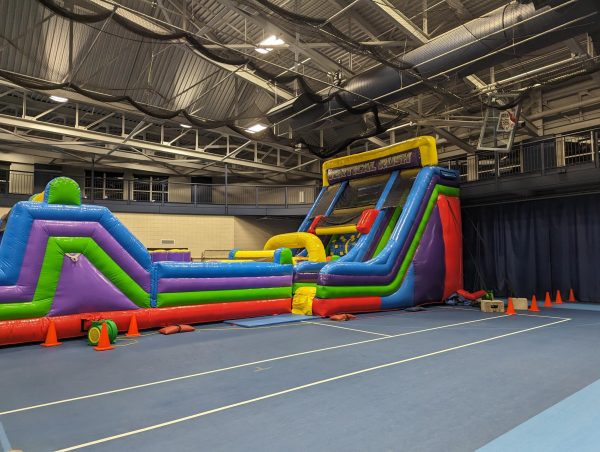Strong and empowered: Celebrating Allegheny women
This International Women’s Day, March 8, 2019, will be the last International Women’s Day and March will be the last Women’s History Month without a woman holding Allegheny College’s highest office. When President-elect Hilary Link is sworn in July 1, 2019, history will be made.
Though women have made great strides toward equality in recent history, women are still subjected to discrimination and gender stereotypes.
Professor of Chemistry Alice Deckert knew she wanted to teach at a liberal arts institution and applied to Allegheny when there was a job posting for a physical chemist. She thought she wanted to teach English, but was ultimately drawn to chemistry, despite the field being male-dominated.
“I think that there are definitely some challenges that come along with it; personally, I don’t feel like I’ve no big, huge moment of ‘wow I’m really getting discriminated against,’” Deckert said.
Deckert pointed out the lack of women in the physics and computer science fields compared to chemistry, and the lack of female chemists compared to the number of female biologists. She described the situation as being parity at the college level.
“If I look at my classes, probably more than half of them are women a lot of the times,” Deckert said. “We’ve got the women taking chemistry at the college level, but then if you look at the graduate school level, there’s not parity.”
Deckert emphasized the lack of women at the graduate school level, which means the number of women with doctorates is low.
Deckert described the need for female chemists to have tough skin as they face a mostly-male field of study.
“I think that you have to recognize all of the little things that are not fair but not let it hold you back,” Deckert said. “Have that be something that pushes you forward rather than have it being something that holds you back.”
Deckert stated how having women in upper management positions is a step in the right direction. She does not believe having more people in the field is the only answer.
“The fact that more and more women are beginning to show up at the higher administrative levels, not just in higher education but also in industry, can only help things,” Deckert said. “I think there’s lots of ways that we have to attack gender parity in STEM fields and other fields as well.”
Although the STEM field is still victim to gender stereotypes, the world of athletics has remained mostly impartial to gender roles in comparison.
Head Women’s Field Hockey Coach Valerie Lohr, who started several athletic programs in the past, was first introduced to field hockey because her sisters played the sport. She ended up at Allegheny because it felt like home.
“It’s such a wonderful place to be everything that you could possibly be, and everyone here whether it’s in athletics, academics, advising, staff, faculty, everything, they’re all just conspiring to help each other reach the best possible versions of themselves,” Lohr said.
She described how honored she is to be the first coach for women’s field hockey at Allegheny, noting how it is not just the women on the field who make the team, but everyone who impacts them.
Lohr discussed the importance for young women to try something new. She said you will never regret trying, but always regret not trying. She also pointed out the importance of accidents and that it is okay to misstep.
“Keep asking for help and don’t be afraid to be bold; be kind and be bold,” Lohr said. “Being bold doesn’t mean being too directive or mean, but there’s nothing wrong with saying what you want and going for it. People will respect you for your honesty, and they’ll know your trajectory if you’re just honest about it, and there’s no shame in going for it.”
Lohr hopes to impact her students as a role model both by her words and her actions.
“We want to give them the confidence that they can walk into any room and know that not only should they be there, they deserve to be there because they worked really hard and that the only thing holding them back will be themselves,” Lohr said. “We want to break those barriers down for them and have them walk away as confident, well spoken and driven young women.”
Lohr expressed her excitement for Link’s arrival in July.
“I think that it’s inspiring to be able to say that we are here at Allegheny creating this new team, this new era, and Allegheny’s all for it,” Lohr said. “President Mullen’s fully behind it. President Link, I’m sure she’s fully behind it. No one wants to see anyone do anything except succeed, and that has got to get (the students) jazzed for sure.”
Professor of Music Julie Hepler was drawn to Allegheny mostly because of her husband, Lowell Hepler, director of bands, who she met before applying for the job. Originally starting on flute because it was “a girl thing,” she eventually found clarinet and bassoon.
“I love it at Allegheny,” Julie said. “I wasn’t sure because I’m a product of extremely large music schools, and I couldn’t figure out what a small place like this had to offer, but in this climate today, this is the way to go.”
One noticeable challenge Julie faced was her father’s objections. She said he believed music was an avocation rather than a vocation.
She spoke about facing chauvinism in her years of playing in orchestras because she was one of the few women who played her instrument. She attributes this to the time period, when a male could make comments about a woman’s appearance and it was not as big deal of a deal as it is now.
“It was just what happened; men made creepy comments to women and we’re just supposed to shrug it off so that’s how it was,” Julie said.
Julie said she is delighted to see times changing, but urged younger women to be more patient with older people because of the generational disconnect.
When discussing her dealings with chauvinism, Julie said she does not get offended easily.
“I can’t control other people, but I can control my own reactions to it,” Julie said. “It taught me patience with others, trying to see situations from other people’s points of view and if I wanted to work I had to get along with these people.
Julie prefers taking a gentler route to handling chauvinism, believing gentle change leaves a more powerful impact on people.
An additional challenge Julie continues to battle is her health. She recently underwent chemotherapy, missing a majority of the fall semester and being unable to play at the professional level or being able to teach her students. She completed her last chemotherapy session before winter break and has recently been declared N.E.D., or No Evidence of Disease.
“I’ve had to figure out different ways of teaching and just different ways of being, because when you’re a musician, you have to totally rethink who you are in this world when you can no longer do things at the level that you’re used to,” Julie said.
Julie emphasized the need for women to not sacrifice their natural femininity.
“You can be feminine and be strong and be a leader at the same time,” Julie said. “Don’t feel like you have to totally shut yourself off from that in order to be successful in the arts.”
As Allegheny prepares to make history this summer, the college will see a woman take the highest office for the first time.
“I think it’s high time that Allegheny has a woman in a position at the presidency level,” Deckert said. “We’ve never had a woman president, and I think we’re lagging behind the times in that.”
Julie and Lohr shared similar excitement, with Lohr stating how wonderful it will be for her students.
“I think I’m just really excited to be at Allegheny,” Lohr said. “It’s a perfect time to start writing history, breaking records, and I have (been) met with nothing but support from everyone that’s here, so I can’t imagine this not being an incredible journey coming forward.”






